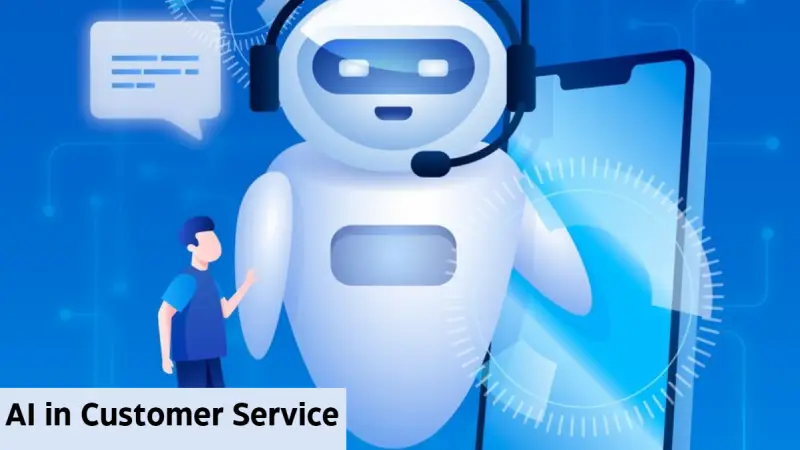Customer service is a big part of any business, and artificial intelligence (AI) is changing the game. With tools like chatbots that answer questions instantly and systems that predict what customers might need, AI is making support faster and smarter. But what does this really mean for businesses and customers?
In this blog, we’ll break down everything you need to know about AI in customer service—how it works, its benefits, challenges, and what the future holds. Whether you’re running a business or just curious about technology, this guide will help you understand how AI is shaping the way we connect with companies.
What is AI in customer service?
AI in customer service involves using advanced technology to improve how businesses interact with their customers. These AI tools are designed to make support faster, more efficient, and personalized to individual needs. For example, they can handle routine tasks like answering common questions, guiding users through processes, or resolving simple issues automatically.
This not only speeds up service but also reduces the workload for human agents, allowing them to focus on more complex problems. By automating tasks and streamlining workflows, AI helps companies save time, cut costs, and deliver better customer experiences overall.
Benefits of AI in customer service
As AI enhances the customer experience, it also delivers major benefits for businesses. Here are the key advantages of using artificial intelligence in customer service:
1. Reduce Costs:
AI cuts customer service expenses by automating repetitive tasks and inquiries. This allows support teams to solve more issues with fewer resources and focus on higher-value work.
2. Enhance Customer Satisfaction:
Quick and convenient service is essential for building customer loyalty. AI-powered chatbots offer 24/7 support, reducing wait times and improving satisfaction.
3. Improve Agent Efficiency:
AI takes over repetitive tasks, lightening the workload for customer service teams. This gives agents more time to focus on meaningful work, making their roles more rewarding.
4. Increase Productivity:
AI provides instant support without needing human involvement. If a human agent is required, AI offers insights and suggested actions, speeding up issue resolution.
5. Simplify Operations:
AI identifies which inquiries can be automated and improves workflows, helping teams operate more efficiently.
6. Personalize Interactions:
AI provides agents with customer insights, enabling them to tailor solutions to individual needs.
7. Manage High Demand:
AI can handle a large volume of customer requests across multiple channels, helping teams manage peak support periods effectively.
Use Cases of AI in Customer Service
AI in customer service has been around for a while, but many companies are still figuring out how to use it effectively. Here are some simple ways to use AI in customer service:
1. Use AI Agents
AI agents are advanced AI-powered bots trained on real customer service conversations. This means they can handle unclear or complicated questions without getting confused. With conversational AI, they can understand and solve even the most complex customer problems, managing requests from beginning to end.
2. Proactively guide agents
AI tools can actively help agents by suggesting responses that match each customer’s specific needs. This boosts their productivity, speeds up issue resolution, and makes it easier for agents to handle problems, especially when they are new to the job.
3. Automate workflows
AI in customer service can simplify tasks, helping customers get faster support and making agents more efficient. Here’s how AI can improve support workflows:
- Smart Routing: AI can direct customer inquiries to the best-suited agent by analyzing the purpose, tone, and language of the request.
- Response Suggestions: AI can review ticket details and recommend ready-made responses to speed up replies.
- Ticket Summaries: AI can condense long conversation histories, saving agents time by providing quick summaries instead of requiring them to read through lengthy details.
4. Optimize workforce management
AI-powered workforce management (WFM) is essential for running support teams smoothly. By studying past data, AI can forecast how many staff members are needed on certain days, months, or during busy seasons.
This helps cut down on overtime expenses and shortens customer wait times. It also handles scheduling automatically and customizes shifts for each team member, saving both managers and employees valuable time.
5. Improve call management
AI tools in call centers help by automatically creating summaries after calls, which saves time for agents. They also record and transcribe calls to help train agents better. Voice quality assurance (QA) software uses AI to evaluate phone conversations and identify customers who might stop using the service. AI agents can also assist in handling these tasks efficiently.
6. Improve your help center
AI for customer service can improve your help center by checking how well your knowledge base articles are doing and pointing out which ones might need updates or removal. It can also recommend new articles to cover missing topics based on your service data and even help create content. Using AI writing tools, admins can write, adjust the tone, or simplify articles, making it easier to grow your knowledge base.
Additionally, AI agents can use the knowledge base to show relevant articles and answers to customers during conversations.
Read also: Using AI in Insurance Underwriting: A Complete Guide
Conclusion
AI in customer service is transforming the way businesses interact with their customers, offering faster, more efficient, and personalized support. From chatbots and virtual assistants to predictive analytics and sentiment analysis, AI-powered tools are enhancing customer experiences while reducing operational costs.
However, it’s crucial for businesses to strike a balance between automation and human touch, ensuring that technology complements rather than replaces the empathy and understanding that only human agents can provide.
As AI continues to evolve, its role in customer service will only grow, making it essential for companies to stay ahead of the curve by adopting these innovations thoughtfully and strategically. By leveraging AI responsibly, businesses can build stronger customer relationships, drive loyalty, and thrive in an increasingly competitive landscape.

